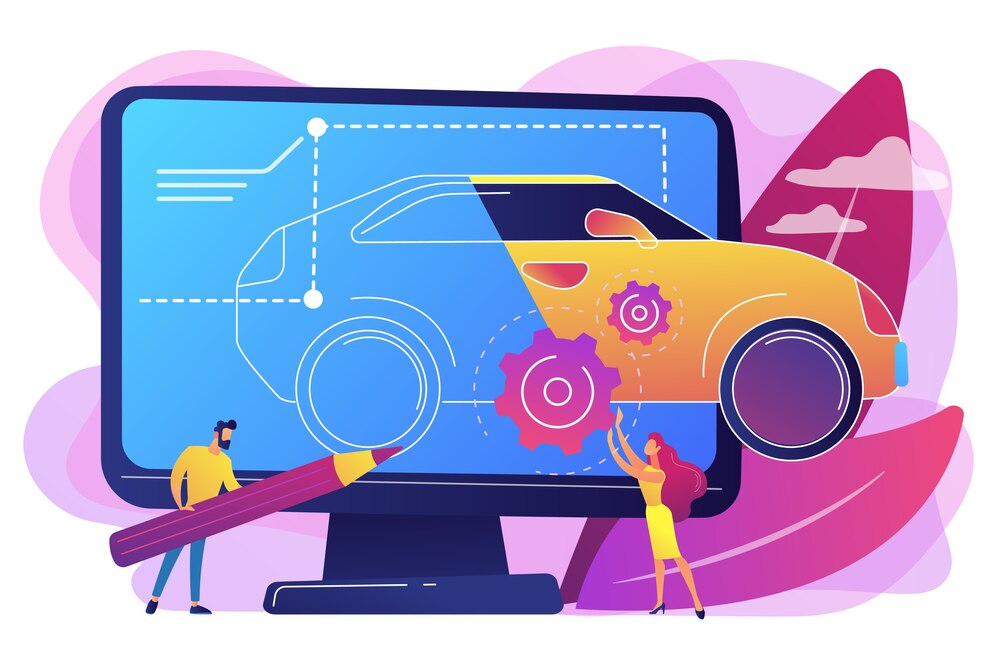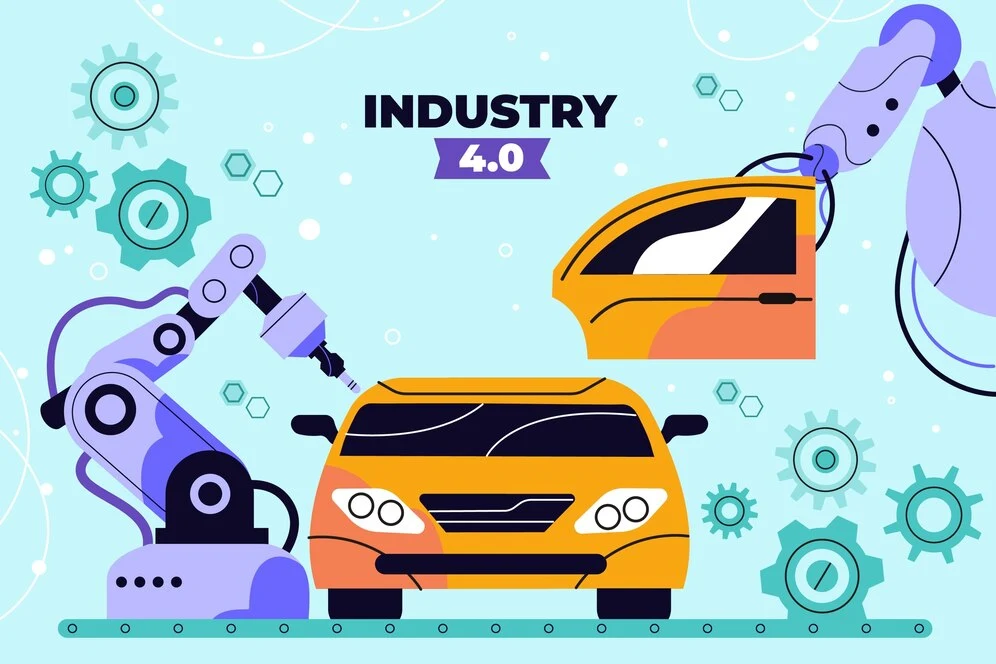ERP for Automobile Industry: Enhancing Efficiency and Innovation
In the current highly competitive and technologically driven world, the auto industry is among the most complicated and dynamic industries. With an abundance of moving parts, international supply chains changing requirements from customers, and even the need for regulatory compliance, businesses operating in this field have to constantly create new ways of doing business while maximizing their efficiency. Enterprise Resource Planning (ERP) is now an essential element of the success of businesses, providing a single method of managing a variety of operations. This article examines the revolutionary impact of ERP for automobile industry, and outlines the ways that the best ERP solution can help unlock incredible growth.

The Need for ERP in the Automobile Sector
The auto industry operates in an intricate network of dealers, manufacturers, suppliers along with service facilities. Every component in the value chain has to be able to function seamlessly in order to ensure customer satisfaction and financial success. Traditional methods for managing inventory, production logistical, financial, and other aspects frequently fail because of their inefficient nature. This is why ERP solutions can help solve the problem.
ERP Systems are developed to bring together the core business processes of a company into an integrated platform that allows real-time data sharing, better coordination and strategic making. With an ERP software for the automobile industry, businesses can streamline mundane tasks. They can also gain useful data, and guarantee that departments are in sync. This improves efficiency, but also increases agility when responding to market trends.
Key Benefits of ERP Implementation in the Automobile Industry
The implementation of an ERP system can bring many benefits to automotive companies. Here are some major benefits:
- Streamlined operations: ERP solutions unify various business functions like manufacturing, procurement and sales management, inventory management finance as well as human resource management. This leads to more consistent workflows, less mistakes and fewer redundancies.
- The ability to access data in real-time: By utilizing central data repository, decision-makers are able to have access to the most current information, keep track of the performance of their organization, and make educated choices.
- Improved Supply Chain Management: ERP software helps improve demand forecasting, collaboration with vendors, and logistics planning, which leads to shorter lead times as well as improved levels of inventory.
- Control of Quality and Comply Automotive companies must comply with rigorous quality standards as well as the requirements of regulatory agencies. ERP systems have modules for monitoring quality control measures and monitoring the compliance.
- Cost reduction: By automatizing manual processes and enhancing the utilization of resources, ERP systems help in cutting operational costs and boosting overall profit.
- Flexibility and Scalability Contemporary ERP software is flexible and can handle future growth. When it comes to expanding manufacturing facilities or establishing new markets, ERP systems are able to adapt to the demands of business.
Modules of Automotive ERP Software
An efficient automotive ERP program comprises a variety of key modules, which are designed specifically to the particular requirements of the business:
- Manufacturing Management: Aids in planning and scheduling manufacturing processes to ensure prompt delivery.
- Management of Inventory: Controls the inventory of raw materials, work-in-progress and inventory of finished goods with real-time monitoring.
- The Procurement Management and Supply Management Improves buying activities and improves the collaboration between suppliers.
- Customers and Sales Management (CRM) Improves customer engagement, and also helps manage sales pipelines.
- Accounts and Finance: Keep track of expenditures as well as revenue, budgeting and financial report.
- HRM: Handles the employee’s records as well as pay, recruitment, as well as evaluations of performance.
They work together to give a complete perspective of the business and ensure that every aspect of the company are aligned with goals of strategic importance.
Choosing the Best ERP for Automotive Industry
Choosing the most suitable ERP to support the auto industry is weighing a variety of factors, including the size of your business, its cost, complexity, as well as the future objectives. The optimal ERP system should be specific to the industry as well as customizable and easy to integrate into existing infrastructure.
A few of the characteristics to be looking for are:
- Cloud and On-Premise deployment options The flexibility to choose an appropriate deployment model to meet the requirements of your company.
- User-Friendly Interface: A user-friendly design that encourages user acceptance and minimizes the time required for training.
- Capabilities to Customize Modularity to be tailored in accordance with particular business requirements.
- Affirmed Support and Updates regular updates, technical support as well as a lively user-based community.
When investing in the best ERP solution, companies can boost innovation, increase customer satisfaction, and attain long-term sustainable growth.

Role of Custom ERP for Automobile Industry
Although off-the-shelf ERP solutions provide standard functionality however, they are not able to meet the specific requirements of each automotive company. This is why custom ERP designed for the automobile industry can be vital.
These systems can be created to be compatible with certain business procedures, goals and regulations. They are able to expand or alter features as business needs change. For instance, a company specialising in electric vehicles might require battery tracking modules charging infrastructure, battery tracking, and environmental compliance. These features may not be found in the typical ERP software.
The benefits of customized ERP Solutions include
- Personalized Functionality features that are directly designed to meet the needs of business.
- More Efficiency: Streamlined processes with the least amount of workarounds.
- Competitive Advantage: Unique abilities that distinguish the business from its competitors.
- Long-Term Cost Savings: Reduces the requirement to purchase multiple software tools or redundant systems.
Importance of Custom Software for Automotive Industry
Alongside ERP systems and custom software designed for the automotive industries plays an important function in supporting the specialized functions like dealership management, vehicle diagnostics and connected car technology. Custom software solutions are created to work seamlessly to ERP platforms, resulting in an efficient digital ecosystem.
These solutions can be used to:
- Advanced Analytics: Predictive Maintenance, analysis of customer behavior, and forecasting sales.
- IoT Integration: real-time information from connected vehicles can be used for performance monitoring.
- Mobile Applications Applications designed for sales reps and customers.
- Service Management: Dealer and Service Management Controlling dealership operations, availability of parts, and service appointments.
Custom software is a great complement to ERP systems by taking on particular areas that ERP modules may miss.
Future Trends in ERP for Automobile Industry
The auto industry is on the point of an era of digitalization. New technologies are transforming the direction of ERP systems, and increasing their capabilities.
- AI as well as Machine Learning: These technologies improve predictive analytics, automate the process of making decisions, and increase accuracy of forecasts.
- Internet of Things (IoT) ERP systems that are IoT-enabled are able to collect real-time information from machinery, vehicles and sensors, enhancing visibility into operations.
- Blockchain: Enhances transparency and traceability of supply chains.
- Cloud Computing: Provides flexible, cost-effective and accessible ERP solutions.
- Mobile Accessibility: Allows anytime, anyplace access to ERP information, increasing productivity.
Companies that adopt these patterns will be better equipped to adapt, innovate, and be a leader in an changing market.

Speetrance: A Trusted ERP Partner for the Automotive Industry
If you’re looking for secure and modern ERP solution, Speetrance stands out as an established supplier for automotive companies. Speetrance is a specialist in the provision of ERP software for the automotive industry that is specifically designed to meet the demands of manufacturing and parts supply along with dealership and parts supply.
Their ERP solutions are stocked with options like production automation as well as real-time inventory tracking quality management and advanced analytics. Speetrance also provides custom development solutions, which allow clients to develop ERP systems that are in sync to their processes. With a particular concentration on user-experience as well as scalability and customer service, Speetrance has helped numerous automotive companies to achieve efficiency and digital transformation.
Conclusion
In a market as dynamic and demanding as the auto sector, ERP systems play a essential role in maintaining development and competitiveness. From enhancing operational efficiency to enabling data-driven decision-making ERP solutions can be used to revolutionize all aspects of the automotive industry.
Selecting the best ERP system, whether custom or standard-built, it can help businesses to overcome markets, meet the latest regulations and meet customer demands. As technology advances as it does, the integration technology of AI, IoT, and cloud computing will increase capacities that ERP systems.
For companies looking for a trustworthy partner to help them along this path such as Speetrance provide the knowledge and innovativeness required to set up the top of the line ERP software specifically designed for the automotive industry. With the correct ERP plan, automotive businesses will not just survive, but thrive in the new digital age.

